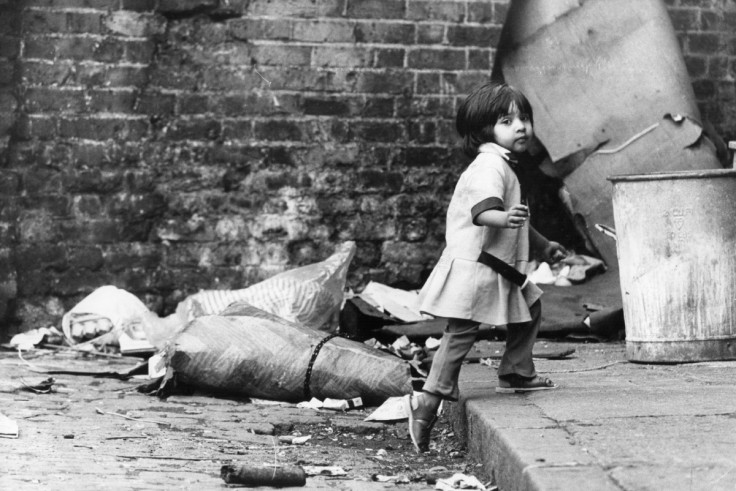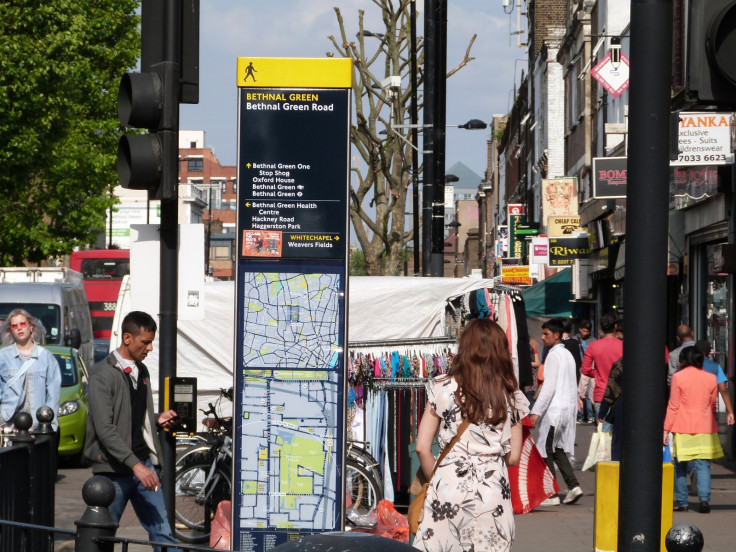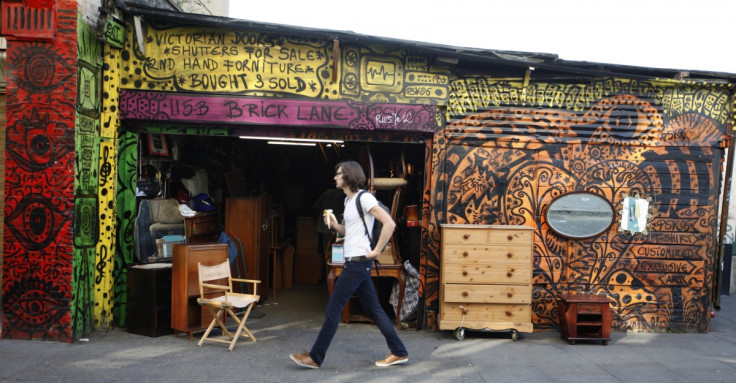Cereal Killer Café: Ignore Class War's trustafarian anarchists, gentrification should be celebrated

I lived in Bethnal Green, east London, for a year before I reached my anti-hipster tipping point. It was after work one evening at Tesco on Bethnal Green Road. There he was in the meat aisle: long floppy hair on top, shaved to the skin around the sides, an oversized black poncho, black hotpants, knee-high black socks, winkle pickers on his feet and a cross earring dangling from one ear.
He louchely fondled a packet of beef mince, posing with the other arm limply extended out, a giant man bag dangling from his elbow crease. At that moment, after a year, I was done with Bethnal Green and its hipsters.
Nobody likes hipsters. Not even hipsters like hipsters. So far be it from me to defend them. But the violent attack on the Cereal Killer Café by the soap-dodging trustafarian anarchists of Class War goes far beyond the obligatory disdain for hipsters.
'The hipster mothership'
Drunkenly smashing up a small business on Brick Lane in the name of "anti-gentrification", even if it's the hipster mothership, can't be tolerated for three main reasons: it's stupid, counter-productive and patronising. And the irony is that if Class War knew to walk around the corner on to Bethnal Green Road – evidently, they're not local – they would have seen a community alive.
The endless row of market stalls, fry up cafés, Bengali emporiums that sell everything you could ever need, Indian sweet shops, old school East End pubs and trendy new ones, the butcher, the Percy Ingle bakery, the pie and mash shop, the shoe seller, the sari store – and estate after estate of social housing.
It's stupid because we should remember what Brick Lane was like before gentrification. Pictures from the 1970s and 1980s show just how squalid, dirty and impoverished the area was for those who lived there among the bomb sites, corrugated iron and grime. There is a nostalgia for the old poor communities in the area: from the Huguenots to the Irish to the Jews to the Bengalis. That this sense of community is being lost.
But these communities were driven together because of their shared struggle through a life of urban deprivation. I doubt, given the option, they would have chosen poverty over an easier life. They were communities of circumstance making the best of what little they had.

Look at Brick Lane now. Tourists and locals flood the area. For the street markets, the curry houses (some of which are better than others...), the nightlife, the nik-nak shops. It has had fresh life – and money – breathed into the area by redevelopment. Old character buildings that may well have been left to rot are saved by the businesses that move into them. New jobs have been created and these firms pay business rates to the local council, revenue to be spent on the locals who need and use public services.
The Cereal Killer Café is a small business started from scratch. It is providing the area with jobs and tax revenue, as well as attracting punters to the area who may spend cash elsewhere in and around Brick Lane. Gentrification has swept through some of the poorest, most run-down areas of London and picked them up off the floor, dusted them down, and given them a new start – and Brick Lane is one such example.
This is what gentrification means: investment, redevelopment, jobs. And who are among the biggest beneficiaries of this regenerative process? The people who live locally to it.
The Class War protesters and their fellow anti-gentrification ilk are also deeply condescending to those on low incomes. Treating them as though they have no desire for or understanding of boutiques and artisan bakeries and cultural centres and all the rest of it.
That the ignorant poor don't like nice things so should be kept in class stasis by filling their communities with bookies and greasy spoons and cheap boozers instead. Never mind art. The poor don't like art. They like bangers and lard and John Smith's and accumulators. Real, authentic, working-class community staples: from William Hill to Wetherspoon pubs. Solidarity in the s**t.
So these streets should be preserved in their misery, believe Class War, like some sort of immersive Dickensian experience for the middle classes. A live action theme park where you can meet real life Cockney urchins, shoeshines, chimney sweeps, East End villains, toothless stout-drinking grannies, feel the genuine threat of violence, sleep in damp stained tenements, skip down cobbled streets.
A place for gap-year students and graduates to rough it like bohemians before they succumb to the inevitable and get professional jobs in finance, advertising, publishing, or selling their terrible art. Pulp captured this vile attitude in the song Common People.
Keep Hackney S**t
I met someone who worked as a senior official at City Hall with an urban regeneration brief. He told me a little story that encapsulates the fetishisation by the middle class of working-class authenticity. He went to meet an architect in Hackney who he was doing some work with. And nestled on her jacket sat proudly a button: "Keep Hackney S**t".
Well bully for the person who can retreat back into the comfort of their period terrace of an evening, and not have to survive out there in authentic Hackney, or "s**t" Hackney, like those who have no choice but to live on gritty, crumbling sink estates. Grim urbanism may be modish for some, a boho lifestyle where slumming it is a choice. But it is real life for others.
I think of my own experience growing up. I lived in social housing, a flat in a tower block in south-east Essex. The area was horrible, one of the county's most deprived. When I played football in the park, adults would sit nearby injecting heroin. I cut my leg on broken beer bottles. Gangs of kids would roam around tormenting people. I saw a young girl get kicked and spat on for being poorer than everyone else, which was evident because of signs of neglect: filthy clothes, grubby face, greasy hair.
The week we moved out, someone on the bottom floor had their front door kicked in and was stabbed to death in front of their child. Shops closed down. The children's play equipment in the park was rotting. This was my reality of growing up working class.
What I would have done for regeneration, for redevelopment, for gentrification of that place. What most of us would have done. For a bakery, or a café. More jobs in the community. For nice things full stop. For a window to a lifestyle to aspire to, a chance to break out. For investment in the estate and us.

What I didn't need, and what London's low income communities today don't need, is a bunch of revolutionary pseuds who have read more Marx than their brains can handle to smash things up, to fight against development and regeneration in the communities that need it most, and to patronise an entire class of people, who have individual needs and desires, by appointing themselves the voice of it.
None of this is to say that gentrification is flawless. There are challenges as well as significant benefits. Gentrification accelerates rent and house-price growth. But the exorbitant cost of rents is a symptom of an underlying cause which has nothing to do with gentrification: a housing shortage. To counter the rising cost of commercial and residential rents that gentrification brings with it, much more building needs to happen in London.
Build more social housing
Abolish the green belt. Fill up the existing brownfield sites. Make sure developers stick to the affordable homes quota demanded of them when they get planning approval. Stop selling off social housing and not replacing it. Build more social housing to help reduce the housing benefit bill. Stop or slow the pace of housing benefit cuts for those who live in London. Cut income tax further for the lowest paid, and get firms that can to pay better wages to their staff.
More homes have to be built to stop the spiralling of rents. Pay has to rise so people can cope with the cost of living in London. It's not the fault of businesses such as the Cereal Killer Café that rents are rising. It's years, and years, and years of failure to build enough houses. It's the local and national governments, policymakers, legislators, who have not got to grips with the housing crisis in the south east of England.
Gentrification's costs can be balanced by ensuring there is enough affordable housing that low income families are not forced out. This is about getting the best of both: a diverse community where people across the social spectrum can afford to live in an area dragged out of the dumps by gentrification.

This is where the real battle lies: getting more houses built. Not fighting against those who are actually bringing money into an area through the gentrification process. Who are enriching locals' lives, creating jobs, funding public services by paying taxes. Who are merely serving the market that exists in the area – if there was no demand, the businesses would fail, so the success of the Cereal Killer Café surely shows it is serving the local community.
Groups such as Class War will fail because it's all just a laugh to them. Achieving meaningful change isn't what they're about. They are more about narcissism, posturing among friends in the anarcho-in group, and slapping each other on the back for another good day out fighting the filth. They know their tactics do nothing but irritate and alienate. But they don't care. To them, poverty is a playground.
On 17 June 1863, at St Leonard's church in Shoreditch, was the marriage of George Croucher and Jane Garvey. They are my great-great grandparents. They were poor Londoners. They lived in Dickensian squalor. So I wonder what they would make of the area that now surrounds the church in which they were married.
I'm sure they would recognise echoes of their own experience when it comes to the housing shortage. But I hope they would also recognise the massive progress we have made. If a misguided mob of anti-gentrification campaigners can be complacent enough to focus their exertions on a small café that sells cereal, it can't be all that bad in London.
© Copyright IBTimes 2025. All rights reserved.





















